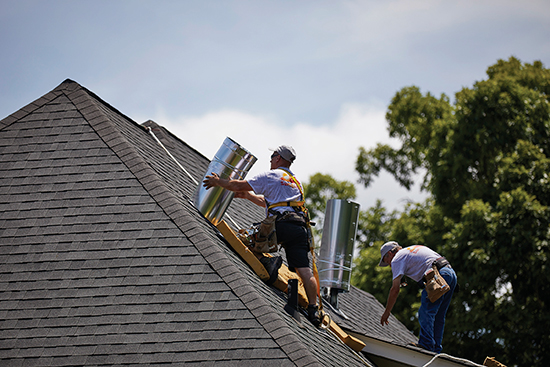7 efficient home improvement projects
(Family Features) The best home upgrades not only make spaces more livable and energy-efficient but are also cost-effective. Making energy-efficient improvements is a savvy way to save money on utility bills, curb energy usage and add to the house’s value.
Consider a variety of home improvement projects, both big and small, that can reduce the financial burden of maintaining your home throughout the year and improve energy efficiency.
Add Insulation
A cost-effective way to save on heating and cooling bills is adding a layer of insulation in the attic where heat loss is typically greatest due to hot air rising. While many newer homes are adequately insulated, those that are several decades old (or older) may benefit from an upgrade in not only the attic but other common problem areas where air can escape such as basements, crawl spaces, fireplaces and ductwork.
Seal Doors and Windows
Windows and doors are common culprits for energy loss. While a complete replacement of doors and windows can be pricey, adding exterior caulk and weather stripping to fill in gaps where air can escape around these openings can make a noticeable difference for a fraction of the cost and make it cheaper to heat and cool your home.

Install Skylights
Skylights are a cost-effective option for transforming any room in the home with natural light while also delivering energy-saving benefits. For example, Sun Tunnel Skylights from Velux can be installed in as little as 90 minutes and funnel natural light from the roof through the attic and into the room below with an aesthetic that resembles recessed lighting. Customizable with six diffuser film styles to complement interior design, the skylights can make a home more energy-efficient by reducing reliance on artificial lighting. An optional daylight controller makes it easy for homeowners to adjust natural light entering a room, and a solar nightlight provides a moon-like guiding light at night. Installed with the solar nightlight, the skylights qualify for a 26% federal tax credit on solar property.
Add Reflective Window Film
When the sun shines through windows, it can heat up the home’s interior quickly and trigger the air conditioner to turn on. Window coverings, such as blackout curtains, can help, but adding low-e reflective window film to your windowpanes, particularly southern-facing ones, can provide an additional shield from the sun’s hot rays and reduce energy costs.
Install a Programmable Thermostat
A programmable thermostat is an efficient way to control the climate inside your home, and those with smart technology take programming to a whole new level. Today’s smart thermostats not only let homeowners control temperatures from their smart devices while on-the-go but can also learn daily habits and adjust the temperature accordingly with no other manual adjustments necessary. In addition, some utility companies offer incentives like money back at the end of the year for installing a smart thermostat because the energy savings are so substantial.
Replace Appliances
Because appliances like refrigerators and ovens, among others, are major energy users, investing in more efficient models provides both cost and energy savings. Additionally, homes more than 15 years old could benefit from updates to the air conditioner or heater as systems 15-20 years old or older may be candidates for replacement as they’re inefficient by today’s standards.
Add Ceiling Fans
In comparison to running your air conditioner consistently, the cost of running a ceiling fan (or several) is significantly less. Particularly on days that may not require cooling the entire house completely, fans can provide a gentle breeze and circulate air in the spaces you use most often. Simply adjust the switch to the counterclockwise position to ensure it’s pushing air downward during warmer months.
For more information and home improvement ideas, visit whyskylights.com/livelighter.







